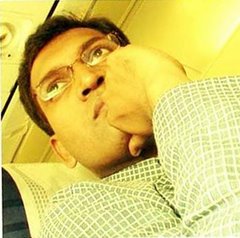Gudsa Usendi isn’t a new name for journalists covering Maoist activities in Chhattisgarh and AP. Only, no journalist has ever met Usendi
On the morning of May 28, 2013, Tuesday, three days after Maoists ambushed a Congress leaders’ motorcade and killed 27 people, some media houses and journalists received a four-page press note and an audio tape statement.
 Sent purportedly by Gudsa Usendi, the CPI-Maoist’s Dandakaranya special zonal committee spokesperson for Chhattisgarh and Andhra Pradesh, the statement claimed responsibility for the attack. According to the media statement, the ambush was to avenge "atrocities committed by Salwa Judum”, the anti-Maoist tribal militia founded by Mahendra Karma, one of the Congress leaders gunned down.
Sent purportedly by Gudsa Usendi, the CPI-Maoist’s Dandakaranya special zonal committee spokesperson for Chhattisgarh and Andhra Pradesh, the statement claimed responsibility for the attack. According to the media statement, the ambush was to avenge "atrocities committed by Salwa Judum”, the anti-Maoist tribal militia founded by Mahendra Karma, one of the Congress leaders gunned down.
Gudsa Usendi isn’t a new name for journalists covering Maoist activities in the two neighbouring states: he is in constant touch with the media, sending audio clips, press notes, updating them about attacks.
Only, no journalist has ever met Usendi. He is what can be called a “phantom spokesperson” for the Maoists.
So, who is this man, Gudsa Usendi? Maoist sympathisers and former ultras say Gudsa Usendi is just a name: the person using that name changes from time to time. Usendi, those in the know of Maoist operations in the region say, is the title used by the spokesperson for Dandakaranya special zonal committee.
To know more about the myth/legend behind Usendi, one has to travel back in time to June 25, 2000. According to reports, it was raining heavily at Potenar village in Abujhmarh, Chhattisgarh, that night when police surrounded a hut while hunting for Maoists. Five ultras were killed, of whom one was identified as Gudsa Usendi, 17. According to former Maoists, Gudsa, who came from the Maria tribe in Abujhmarh, had dropped his given name and took on the moniker ‘Ramesh’ after joining the Maoist ranks. As if to pay back the compliment, a year after his death the Maoist spokesperson of Dandakaranya took on Usendi’s name to keep alive his memory.
To know more about the myth/legend behind Usendi, one has to travel back in time to June 25, 2000. According to reports, it was raining heavily at Potenar village in Abujhmarh, Chhattisgarh, that night when police surrounded a hut while hunting for Maoists. Five ultras were killed, of whom one was identified as Gudsa Usendi, 17. According to former Maoists, Gudsa, who came from the Maria tribe in Abujhmarh, had dropped his given name and took on the moniker ‘Ramesh’ after joining the Maoist ranks. As if to pay back the compliment, a year after his death the Maoist spokesperson of Dandakaranya took on Usendi’s name to keep alive his memory.
The practice has continued ever since.
Police reports and sources within Maoist ranks claim Usendi functions in a professional manner: he is equipped with cellphones, laptops and a team of PR persons among Maoists. A message from Gudsa Usendi could appear as a note under your door, a letter postmarked at a small town on Chhattisgarh-Andhra Pradesh border, an email from an IP address that traces back to a neighbouring state, or even a micro-SD card stuck on a sheet of paper.
For the last two years every Maoist division (equivalent to a zilla in panchayati system) has access to laptop, memory cards, a portable inkjet printer and cellphone. The files – press notes are usually in PDF format – are emailed from the top of a tall tree on a mountaintop where a GPRS-enabled phone can log on to a stray network, it is learnt.
And this is where Gudsa Usendi comes into the picture – never seen, but always read and heard, say former Maoists.

